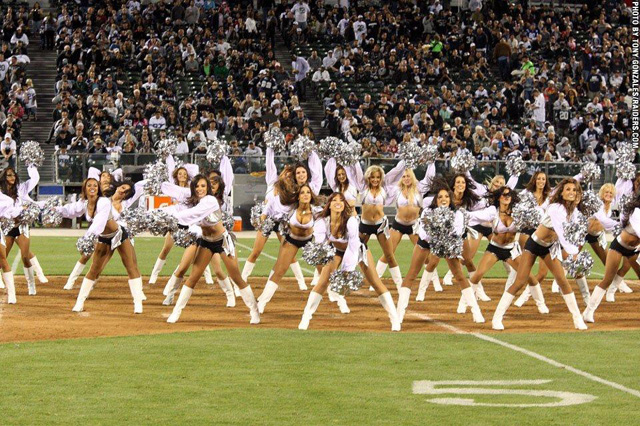Raiders cheerleader sues, says pay is less than $5 an hour

Bob Egelko
San Francisco Chronicle
January 22, 2014
The Oakland Raiders didn’t give their fans much to cheer about during the football season, and now one of the team’s cheerleaders says they’re being shortchanged as well.
Lacy T. accused the Raiders in a lawsuit Wednesday of failing to pay the Raiderettes minimum wages for the work they do, both on the sidelines and in the community for charity. The team also sticks them with travel costs and levies “fines” that eat into their meager salary, she said.
She filed her lawsuit in Alameda County Superior Court as a proposed class action on behalf of 40 current Raiderettes and other members of the squad over the past four years. And she said she hopes other NFL cheerleaders will join the fray.
“I love being a Raiderette, but someone has to stand up for all of the women of the NFL who work so hard for the fans and the teams,” Lacy T. said in a statement released by her lawyer. “I hope cheerleaders across the NFL will step forward to join me in demanding respect and fair compensation.”
The suit identifies her as Lacy T. in accord with a team policy that withholds the Raiderettes’ last names for security reasons.
The Raiderettes’ contract calls for $125 per home game, or $1,250 per season, she said. That amounts to less than $5 an hour, counting hours of unpaid work in rehearsals, performances at 10 charity events and participation in the team’s annual swimsuit photo-shoot, the suit said.
Additionally, the suit said, the Raiders withhold the cheerleaders’ pay until the end of the season, in violation of a state law requiring pay at least twice a month.
“I’ve been dancing for 16 years, and I was paid more for dancing in college than I am as a pro cheerleader,” Lacy T. said in an interview. “I’m a stay-at-home mom, and every dollar out of my pocket is noticed.”
The 27-year-old Alameda resident, hired by the Raiders before the 2013 season, said she was treated much better in the previous two years as a member of the Golden State Warriors’ dance team, the Warrior Girls. They were paid $10 to $14 an hour, depending on experience, with no unpaid work or expenses, she said.
Lacy T. said the other Raiderettes were unaware of her lawsuit until Wednesday, but she’s talked with many of them and “we all have the exact same complaints.”
Her attorney, Sharon Vinick, said she has been told that other NFL teams have similar wage practices for their cheerleaders, though she has not seen the contracts. She said 26 of the 32 NFL teams have cheerleading squads.
In contrast, Vinick said, the teams treat their male mascots as paid employees with benefits, which the Raiderettes don’t receive.
Vinick said the Raiders apparently got wind of the suit and tried to head it off by paying the cheerleaders considerably more than their 2013-14 contract salaries last week – in Lacy T.’s case, $2,780 for 332.5 regular work hours and 10 hours of overtime. That still was less than the promised contractual rate of $125 for an eight-hour shift in a home game, the suit said.
Raiders officials said they would not comment on the suit.
The suit said Raiderettes are required to take part, without pay, in two to three rehearsals per week, the 10 charity events, a team rally, Fan Day and the swimsuit calendar photo-shoot. They must also pay the costs of traveling to those events, it said.
In addition, the suit said, the cheerleaders must buy accessories such as tights, false eyelashes and a yoga mat, and pay for a team-selected hairstylist, whose appointments cost several hundred dollars. Lacy T. claims in her suit to have spent about $650 on those items this past season.
The team fines Raiderettes $10 or more for such offenses as failing to bring the right pom-poms or a yoga mat to practice, the suit said. It said a cheerleader who gains 5 pounds from her weight at the start of the season, or who appears “too soft” to the squad’s director, is benched for the next home game, has to stay in the locker room, and forfeits the $125 wage she would have made for participating, though she still must take part in pregame and halftime activities.
The suit seeks compensation for minimum wages, overtime, expenses and meal and rest breaks that state law requires after five hours of work.



